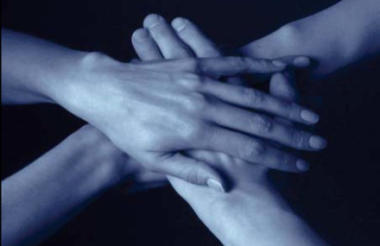The response of ordinary people has been one of the most extraordinary and heartening aspects of the coronavirus outbreak.
In addition to the amazing 750,000 volunteers who signed up to become NHS responders, there has been a mass mobilisation of people helping out informally in countless ways in their local communities. With the epidemic impacting everyone so profoundly and many people unable to participate in their normal voluntary roles or waiting for new ways to participate with local organisations to be set up, we have seen a rapid upsurge in informal or self-organised contributions.
Mutual aid groups have started up right across the UK, coordinating care efforts for people who are self-isolating and connecting those who need shopping or medicines delivered with neighbours willing to help. It’s easy to assume that this is all about younger people helping older neighbours – but the reality is more varied.
'What do you need and what can you give'
Our research tells us that by the time people reach later life, the majority have some experience of contributing to their community. And in this crisis we know that people from mid-life onwards are supporting neighbours, relatives and friends in this crisis; they are not only recipients of the assistance we hear about for older people who are self-isolating, but are also providing it in many forms.
One of my colleagues, for example, told us about a family friend in her eighties who is self-isolating but running a ‘foodbank command centre’ on the phone from her home.
In my local area, the Mutual Aid website assumes that people who want to be involved may see their circumstances change so explicitly asks: "what help do you need?" and "what help can you give?" This reflects what we know about volunteering – that it works best when there isn’t a clear line between "helper" and "helped", and when there is room for people’s needs and circumstances to change.
Volunteering doesn’t just help those on the "receiving end", but has huge wellbeing benefits for those giving their time. This is particularly important at times like this. We know that contributing to our community can give us increased quantity and quality of social connections and improve well-being – things that are really important to sustain as our normal life patterns are halted and most of the usual ways people come together are unavailable.
'Neighbourly volunteering'
The importance people place on being a good neighbour, highlighted in our research, is also being played out in our communities. Age UK has launched a film on its website to encourage "neighbourly volunteering" – which is responding to people asking how they can help by asking them to check up on neighbours and do small acts of kindness like taking the bins out, bringing some shopping etc. It is encouraging people to act on their own without input from external organisations and without the need for applications and training – but with information on where to get further support if needed.
On streets, in blocks and across our communities, social distancing has led people to get in touch with neighbours in other ways through WhatsApp groups, Zoom meetings or coming together for a cup of tea at a distance. It has brought many communities closer together and as well as providing practical help to all members of the community is an important way for people to protect well-being and tackle social isolation.
This neighbourliness is something to be celebrated – but how do we keep it going for the duration of this crisis and beyond? And can we expand it into those areas where it does not occur naturally, as we know those areas are likely to be more at risk? If we can answer these questions, we will be able to harness the community spirit we’re seeing today to transform and build resilience in our communities for the long term.
Rachel Monaghan is programme manager at the Centre for Ageing Better
Related articles











